Apr 2, 2024 12:59 PM
Saxophonist, Sonic Explorer Casey Benjamin Dies at 45
Casey Benjamin, the alto saxophonist, vocalist, keyboardist and producer who stamped his distinctive sounds on the…
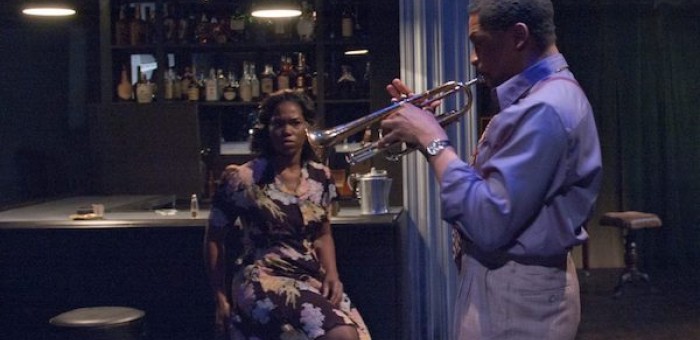
Kristin E. Ellis and Al’Jaleel McGhee perform in Paradise Blue, which premiered April 26 at the TimeLine Theatre in Chicago.
(Photo: Lara Goetsch/TimeLine Theatre)I wonder if anyone will ever write a serious drama or movie about a jazz musician who is not beset by explosive inner demons. I suspect a lot of jazz musicians who resist such clichés wonder that too. Paradise Blue, which received its Midwest premier April 26 in Chicago’s TimeLine Theater, is not that play. To be fair, if it were, it might not be the compelling theater that it is. More to the point, a cliché is essentially a general verdict of reality. Paradise may be fiction, but some of its roots are very real.
The story is set in Paradise Valley/Black Bottom, the African American section of Detroit in 1949. As part of a slum-clearance project, large tracts of residential and commercial property are being condemned, including many bars, clubs and theaters of the entertainment district. All that was true. Out of that, playwright Dominique Morisseau has imagined a fictional jazz club, the Paradise Blue, and a group of five characters who converge there.
The TimeLine production adds a fresh element unique to the Chicago production, an original jazz score written and performed by Chicago composer and conductor Orbert Davis. The pre-recorded music is made up principally of 14 brief transitional sequences separating scenes, and sometimes overlapping effectively with live incidental trumpet solos performed by Al’Jaleel McGhee, who plays the title character. Orbert’s composed sequences reflect the lyrical side of early bebop with a tilt toward Fats Navarro and the textures of Tadd Dameron.
The action revolves around Blue, the club owner, its headlining trumpet star, and all around local big shot. He is both controlling and defensive, and, like many such people, has serious anger management issues when people get near his inner weaknesses. McGhee is tall, handsome and charismatic. He gives Blue an instant physical presence and confidence. But he treats his own people with contempt, believing himself to be held back by lower elements in the community. When he uses the N-word, it is not with collegiality but contempt. He sees no reason not to gouge extra money from his customers by charging extra for ice, and he doesn’t want “anyone tellin’ me how to run my business.”
His business, it turns out, happens to be located on a vital piece of real estate that is key to the white mayor’s plan to buy up property in the area and clear it for urban renewal. Blue insists to everyone that it’s not for sale. What we don’t know until the second act is that he’s always planned to sell the club for $10,000 and sell out those who are dependent on him.
They include pianist Corn (Ronald L. Connor), the one man who can speak truth to Blue’s power, but is mostly too scared to do it. “Blue don’t like nobody questioning his loyalty,” he insists. P-Sam (Charles Andrew Gardner) is a bass player with eyes for Pumpkin, the cute club housekeeper. He also expresses the repressed anger and resentments many felt a decade before civil rights landed on the national reform agenda. “I Stand on them stages,” he tells Corn, “smilin’ like I’m just happy to be entertaining these no-‘count crackers that think of me as less than spilled whiskey on their shoes. To tell you the truth, Blue ain’t no better. He thinks of us just like they do – on the bottom. Only difference is he’s still a nigger himself whether he like it or not.” Or: “I ain’t going back to play to backgrounds for big bands. White band says play this standard, no bop, smile like this, sit like this, take you meal after these folks, nigger. I ain’t doin’ it, Corn.”
The housekeeper, Pumpkin (Kristin E. Ellis), is young, pretty and likes to recite poetry. Shy, innocent and naïve, she is comfortable in Black Bottom where her friends are her family and she wishes for no wider world. Silver changes that.
Silver is the last of the five to enter the story. She slithers on in a nimbus of eye-popping allure and sensuality, which Davis’ score italicizes in a brief perfumed cloud of moaning tenor sax seduction. She has poise, self-assurance and sass—a temptress who has learned to use her body as a weapon of feminist power over men who would crowd or coerce her. None do. If they did, she also carries a loaded silver pistol she once used to put a bullet into her husband’s head. “Once someone sees your gun,” she tells Pumpkin, “they’ve seen all your cards right on the table.” Pumpkin takes the lesson.
Sliver is clearly the hippest person in the room. When she moves into the spare room at the Paradise, she carries a portable record layer and a small stash of Prez and Bird records. (We even hear a bit of “Billie’s Bounce” and Lester Young’s “Mean To Me.”) If Paradise Blue were in the Faustian tradition of 1943’s Cabin In The Sky, the two feminine leads would fall right into place: Pumpkin as a secular reworking of Ethel Water’s loyal Petunia and Silver as the Mephistophelian Georgia Brown as played by Lena Horne.
But no one’s soul is up for sale here exactly, and Blue’s soul, it turns out, is too damaged to be worth much to the devil. His intent to sell off the club is not his only guilty secret. Twenty minutes into the second act we learn that as a child Blue watched his delusional father strangle his mother to death because he saw the devil trying to take her. His failure to save his mother has eaten away at him ever since. Here is where we are invited to emphasize with his past and forgive him his demons. But the play is asking a lot of us at this point. “Blue not a bad man,” Corn tells Silver. “Blue is struggling for the music to redeem and clean him of his sins…. That’s what we call a love supreme.”
The reference to Coltrane, whom no one knew in 1949, is a bit elegiac under the circumstances and suggests a larger difficulty in making Blue convincing as a jazz man. The play contains several spoken references to his transcendent spiritual force as a trumpet player. But we never hear it because McGhee is a far better actor than a musician. If Blue’s music is to redeem his many sins, we in the audience have to feel it to believe it. If Blue was Miles Davis, Louis Armstrong or Bix Beiderbecke, maybe we would. But the “love supreme” reference seems irrelevant and simply muddies the emotional waters.
As it turns out, neither Blue’s music nor his friends spare him the emotional breakdown that soon follows. That and the sale of the club converge in a violent, and perhaps inevitable, ending in which no one keeps his cool.
The play has pace, and the language is witty, vivid and full of internal rhythms that sound real without sounding overdone. Paradise Blue is planning an off-Broadway New York opening within the coming year, though perhaps without Orbert Davis brief but colorful scoring touches. DB
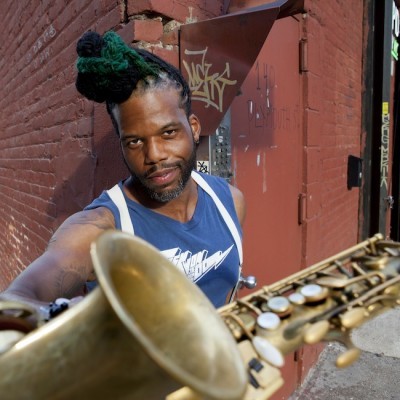
Benjamin possessed a fluid, round sound on the alto saxophone, and he was often most recognizable by the layers of electronic effects that he put onto the instrument.
Apr 2, 2024 12:59 PM
Casey Benjamin, the alto saxophonist, vocalist, keyboardist and producer who stamped his distinctive sounds on the…
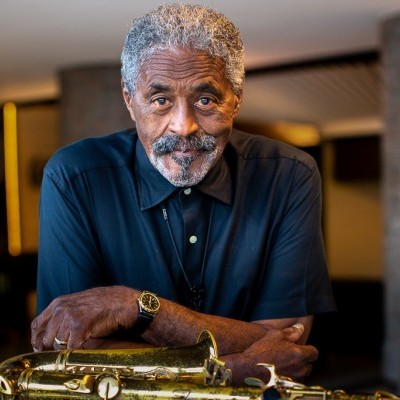
“He’s constructing intelligent musical sentences that connect seamlessly, which is the most important part of linear playing,” Charles McPherson said of alto saxophonist Sonny Red.
Feb 27, 2024 1:40 PM
“I might not have felt this way 30 to 40 years ago, but I’ve reached a point where I can hear value in what people…
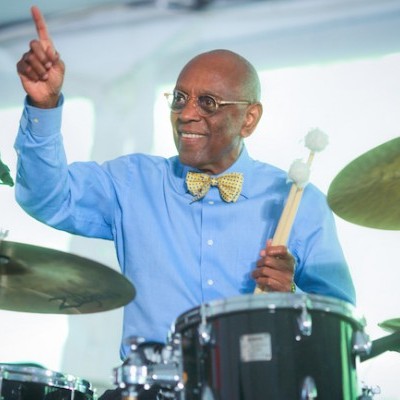
Albert “Tootie” Heath (1935–2024) followed in the tradition of drummer Kenny Clarke, his idol.
Apr 5, 2024 10:28 AM
Albert “Tootie” Heath, a drummer of impeccable taste and time who was the youngest of three jazz-legend brothers…
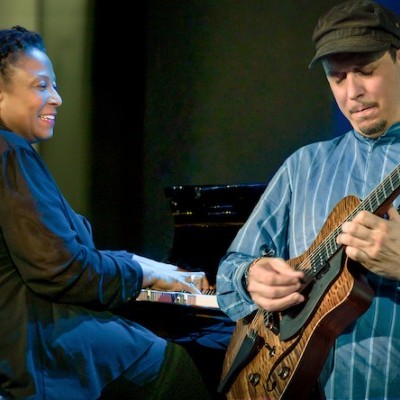
“Both of us are quite grounded in the craft, the tradition and the harmonic sense,” Rosenwinkel said of his experience playing with Allen. “Yet I felt we shared something mystical as well.”
Mar 12, 2024 11:42 AM
“There are a few musicians you hear where, as somebody once said, the molecules in the room change. Geri was one of…
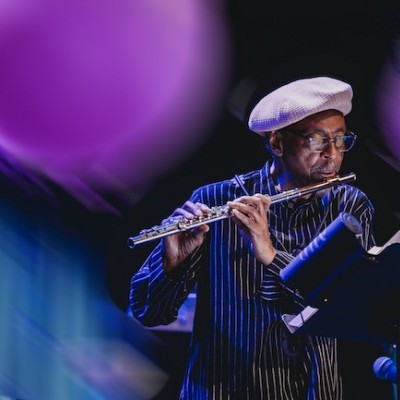
Henry Threadgill performs with Zooid at Big Ears in Knoxville, Tennessee.
Apr 9, 2024 11:30 AM
Big Ears, the annual four-day music celebration that first took place in 2009 in Knoxville, Tennessee, could well be…